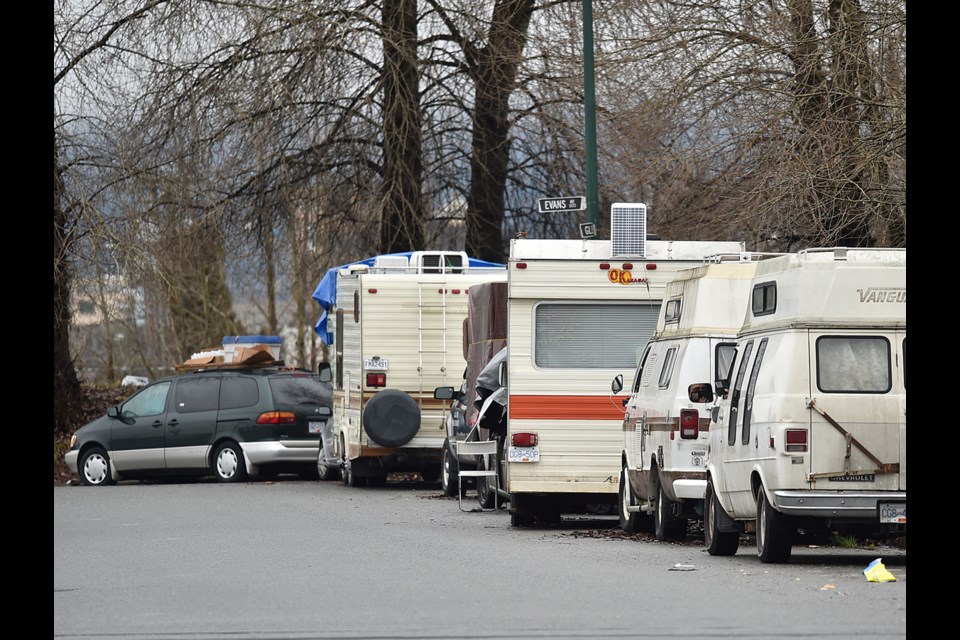It is not where Gord Hocking wants to lay his head for much longer.
But after he lost his room two years ago in a social housing building at Main Street and East First Avenue, where he lived for five years with his disabled girlfriend Geraldine, the 48-year-old carpenter had enough of sleeping on the street and bought a used tent trailer for $600.
It was home for a while, until it began to leak.
So Hocking worked out a deal with the owner of a 1979 Dodge motorhome parked on the same industrial strip where he set up the trailer. He now lives inside the school bus-sized unit with Geraldine, who was evicted two weeks ago from their old building. A friend from Montreal is their roommate.
The trio, who collects social assistance, pays a combined $600 a month.
The name stenciled on the back of the motorhome, which is similar in colour and design to the one popularized in the television series Breaking Bad, seems fitting for the situation the three adults find themselves in: “Elusive Destiny.”
“It’s not the best place to be,” said Hocking, sitting on his bike last Thursday before riding off in the rain to see a doctor and make a visit to a pharmacy. “You can’t really move in there. She’s in a wheelchair, so she can’t really get around. It’s tough, it’s really tough.”
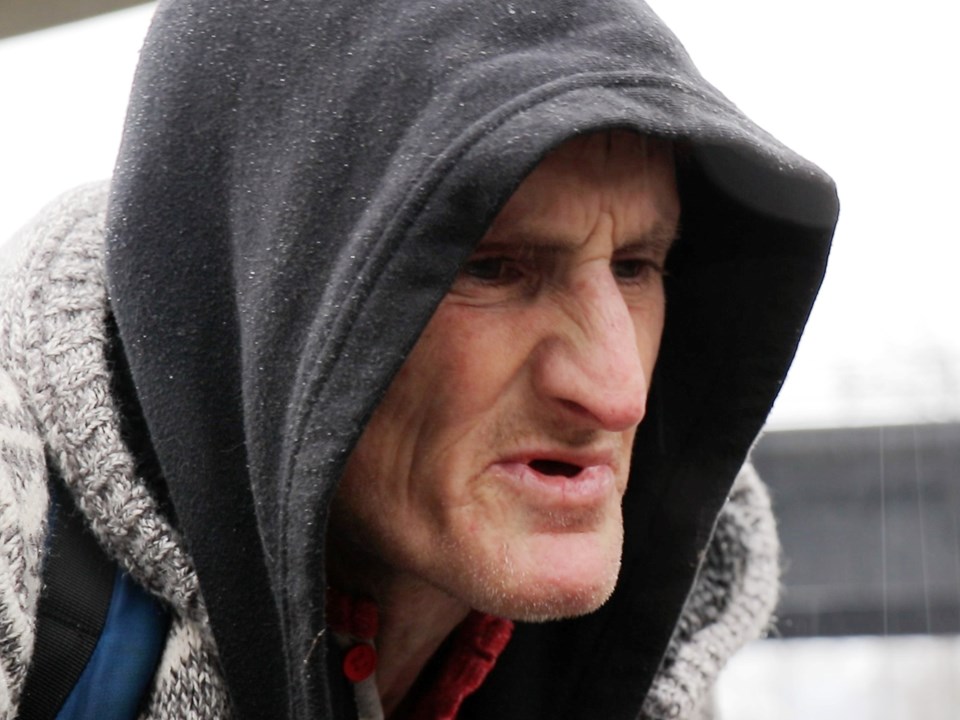
Hocking, who doesn't fully comprehend why he and Geraldine lost their room on Main Street, is among a growing number of people living in recreational vehicles, vans and cars that now monopolize the Evans Avenue-Glen Drive strip, which runs by a recycling depot, Moe’s Home Collection and a Home Depot.
Staff and customers of businesses in the neighbourhood, along with the city’s homelessness services team and parking enforcement department, have all noticed an exponential growth in the last year of people living in vehicles along the strip, which is adjacent to the railyards under the overpass at East First Avenue and Clark Drive.
With that influx, there have been reports of theft from a business, increases in traffic accidents and near-misses (the size of some of the RVs are impeding drivers' views), lack of parking for customers, discarded needles, human waste and garbage strewn across boulevards.
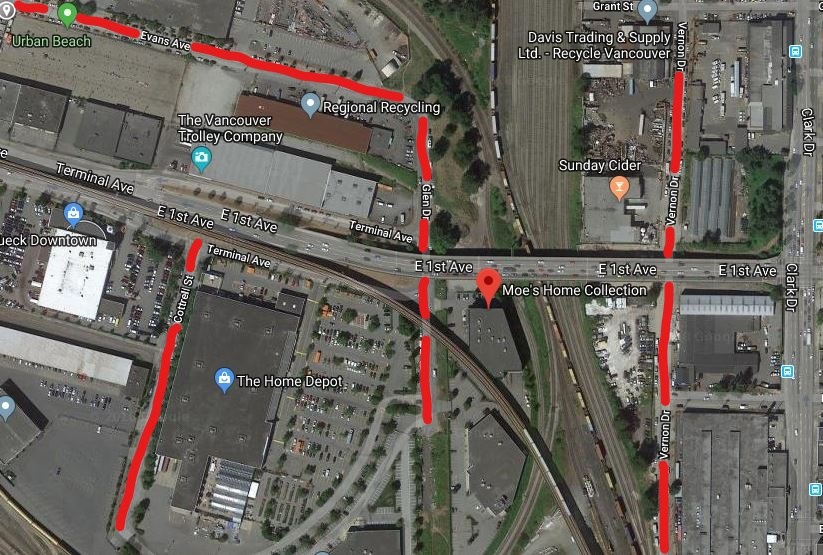
The Courier’s visit to the neighbourhood over two days last week included stops along Cottrell Street at the rear of Home Depot, Malkin Avenue near Strathcona Park and across the tracks on Vernon Drive, where more than 40 RVs and vans were counted in the morning and evening; an additional six cars were spotted with people inside, and piled with clothing and other personal belongings.
The area is one of several in Vancouver that has attracted vehicle dwellers, with the streets around the Canadian Tire complex on Grandview Highway, a neighbourhood adjacent to Queen Elizabeth Park and pockets on the West Side lined with RVs, vans and live-aboard cars.
It is, as some of the people interviewed for this story concluded, a sign of the times in Vancouver, where homelessness is at an all-time high and home ownership and rental accommodations are prohibitively expensive for many residents.
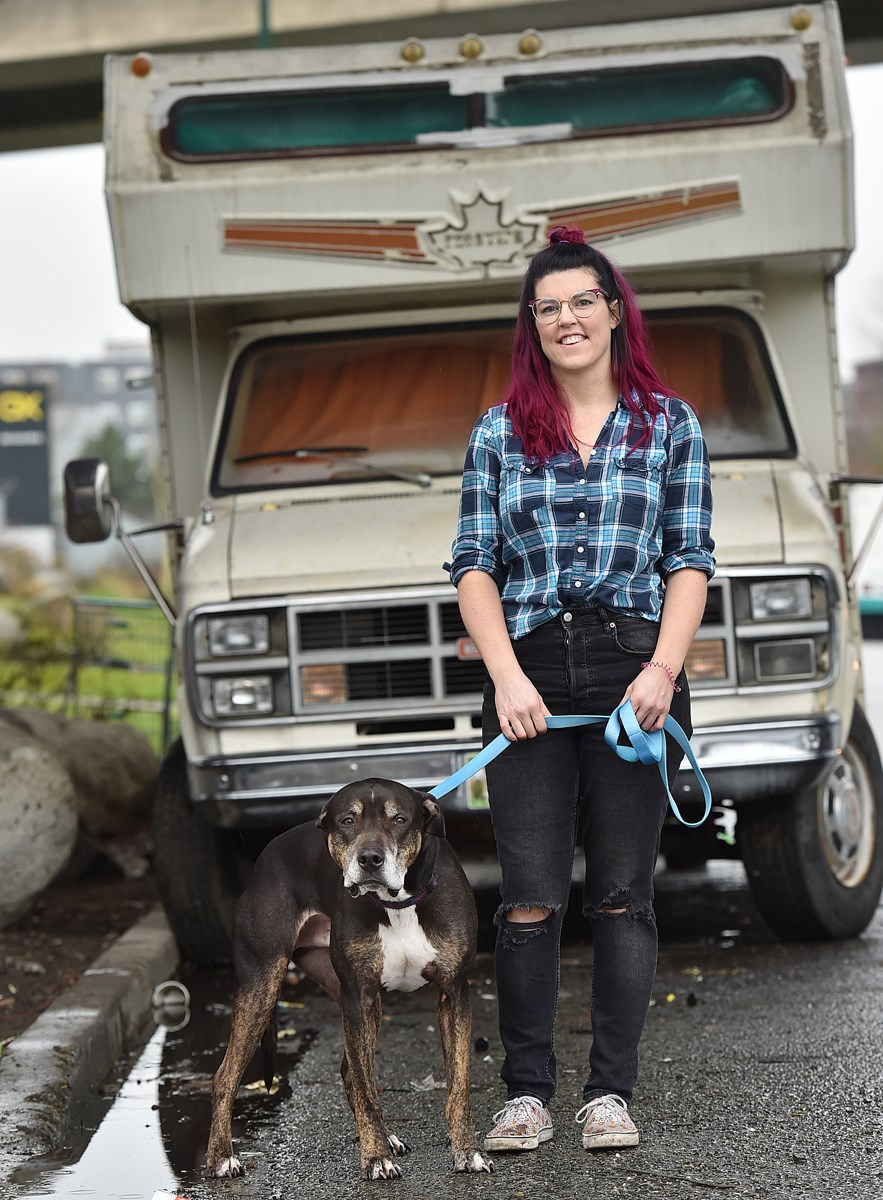
Danielle Eastveld, another RV dweller the Courier met on the strip, said her former landlord planned to boost the rent for her basement suite from $1,350 per month to $1,500. All her income as a bartender, she said, was going to rent and bills.
"If a family can't afford to buy a house here, how are the rest of us supposed to live here?" said Eastveld, who is in her early 30s and lives with her dog Alonzo in a 1981 Frontier motorhome she bought nine months ago for $4,000 off Craigslist. "I know some people say, 'Well why don't you just leave Vancouver?' The job market's not that great out there anywhere. I have a great job. I don't want to leave. Eventually, I know I'll have to. It's kind of crappy that that's my option."
'Couple hundred people' living in vehicles
For the City of Vancouver, the growing community of people living in vehicles has meant taking an approach that requires a delicate balance: it does not want to come off being heavy handed to some of the city's most vulnerable to homelessness, while at the same time respecting complaints from businesses and enforcing bylaws.
Taryn Scollard, the city's director of streets, said the parking enforcement branch works closely with the city's homelessness services department, which is headed by Ethel Whitty. Both spoke to the Courier in a telephone conference call, with Scollard emphasizing that ticketing people living in vehicles and towing them is "our last resort."
But it does happen.
City statistics from an enforcement blitz that occurred Jan. 25 show 12 tickets were issued along the strip, with four vehicles moving on. Another four tickets were issued on Malkin Avenue, but the vehicles remained parked on the road.
As the Courier observed on windshields of some RVs parked on the strip, owners can be ticketed for having an oversized vehicle and parking outside a business for more than three hours. Penalties range from $60 to $150, with the warning on the ticket saying "vehicles with unpaid tickets may be towed for future violations."
It is difficult to estimate how many people live in vehicles on the strip and around the rest of the city; some RVs and vans look abandoned, others — Scollard contends — may be parked there because the owner doesn't have space at home. But Whitty said her team has been in touch with "a couple hundred" people in Vancouver over the last two years who were living in vehicles.
In the last year, at least 10 people were moved into housing and another 10 were provided shelter, income, health services, or a combination. Over the past two weeks, Whitty's team did some door knocks on vehicles along the Evans Avenue-Glen Drive strip and continues to work with people to get them housing and services, although the success rate has been disappointing.
"Ten per cent of the people who we come in contact with take up our services," she said, noting the reluctance of vehicle dwellers is likely connected to having recently lost a home. "Now they find themselves with their only asset being their vehicle. It's theirs, they own it but they don't intend to live in it forever. They feel like they're in transition, they're looking for a job or they're looking for an apartment. So they're not likely to want to go to a shelter."
The Courier knocked on the doors of more than 20 RVs in the neighbourhood, with responses only from Hocking, Eastveld and another man named Ben in an old Chevy camper van, who was on his way to work. Hocking said the people he knew in the other RVs and vehicles were mostly "disability people," including a man living in a car with two dogs.
The type of RVs ranged from old camper vans to large newer looking motorhomes such as a 34-foot-long Dolphin on Cottrell Street, which had a small handwritten sign taped to the windshield that said: "We are working professionals. We'll be gone in 24 hours. Thanks [with a small heart drawn next to it]." The vehicle was still there six days later.
Eastveld said she was one of the RV dwellers the city's outreach team spoke to in recent weeks. They informed her about housing options, but she told them she likely didn't qualify because she earned a decent income and had a dog.
Unlike Hocking, who is collecting a disability cheque of about $1,000 a month and supplements that income with recycling bottles, scrap metal and some odd jobs related to his carpentry skills, Eastveld has chosen to live in an RV on the strip to save money.
"People my age, we were always told to save for your future, and we can't," said the one-time University of B.C. law student, who is originally from Calgary. "I'm in my early 30s and I haven't been able to save until I moved into this [motorhome]. I've saved what I would have paid in rent every single month and I've put it in the bank."
Still, the city considers her an "unsheltered" homeless person. Or, in Mayor Gregor Robertson's parlance, a "street" homeless person — a term Eastveld finds odd considering her choice to leave her basement suite and buy a motorhome.
Inside, she has a sink, a bathroom, a Coleman stove and room enough to hang her bike and house her 80-pound pit bull-mix, who gets regular walks from a dog walking service. Eastveld, who learned to fix a broken alternator belt and install a solar panel on her roof — experiences she found "empowering — said she is mindful of complaints about garbage and discarded needles accumulating along the strip.
She keeps the dirt boulevard outside her motorhome clean, concerned Alonzo might step on a needle. She regularly recycles, dumps her garbage and drives to a sanitation dump in Burnaby, where she pays five dollars to dispose of bathroom waste.
"I would prefer to live in an apartment, where I didn't have to worry about who's knocking on my door in the morning," she said. "But with one income, it's challenging."
'Bottles of syringes'
Eastveld is not likely one of the residents of the strip that Amber D'Amico and Nick Singh are referring to as they walk along a stretch of Glen Drive back to work at Moe's Home Collection. D'Amico is the store's marketing and brand manager, and Singh is a salesperson.
They say in the last year, furniture outside the store has been stolen. So has an awning and a large tent. Also, some RV dwellers have hopped the large fence at night to plug extension cords into the building's outside outlets, effectively "stealing power."
The worst incident was a staff member getting struck by a car as she walked across Glen Drive. They said the driver was unable to see their fellow employee because of the crowded street of RVs, including the one lived in by Hocking, which has a generator, open gas cans and propane tanks strewn on the road at the rear of the vehicle.
"Obviously, it's not visually that nice," D'Amico said. "But outside of that, there's been needles here, we've had empty bottles of syringes, it smells like feces, people approaching us in the morning for cigarettes and that kind of stuff."
Added D'Amico: "It's hard because you don't want to put somebody out of their home, if that's where they're being forced to live. Our economy is tough, the rental market's tough. But if it's causing safety issues for us here, then that's a problem."
D'Amico said complaints to the city have gone unheard, with the store receiving an email from the city saying it was "not in a position to make people homeless" and that it had "higher priorities right now." Her conclusion is "the city's not doing anything."
Scollard said that's not the case.
"Just because they don't necessarily see movement in 24 hours of their call doesn't mean that we aren't taking action, or that we don't take the issue seriously," said Scollard, emphasizing again that the city has a long-term goal to find housing for people living in vehicles.
For Lily Wong, who parked her car across from Hocking's motorhome last Thursday morning, she, too, has empathy for people down on their luck. Wong is a longtime customer of the nearby gift and fashion exchange stores at the end of Glen Drive.
"It's getting worse and worse, and in the summer it's really bad — you cannot park here at all," she said.
Wong doesn't like the garbage, either, or the gutters littered with discarded needles and the sight and smell of human waste. Her solution, like a suggestion from D'Amico and Singh, is to have the city designate an area in Vancouver for people who live in their vehicles, complete with electricity and sanitation services.
"This is a sign of the times and the city has to do something," said Wong, who grew up in Vancouver and supports the city's empty homes tax and controlling foreign ownership of homes. "But that isn't the problem. The problem is controlling rents from skyrocketing. The city has to do something because we're going to see more and more of this — not just in areas like this, we're going to see it throughout the city."
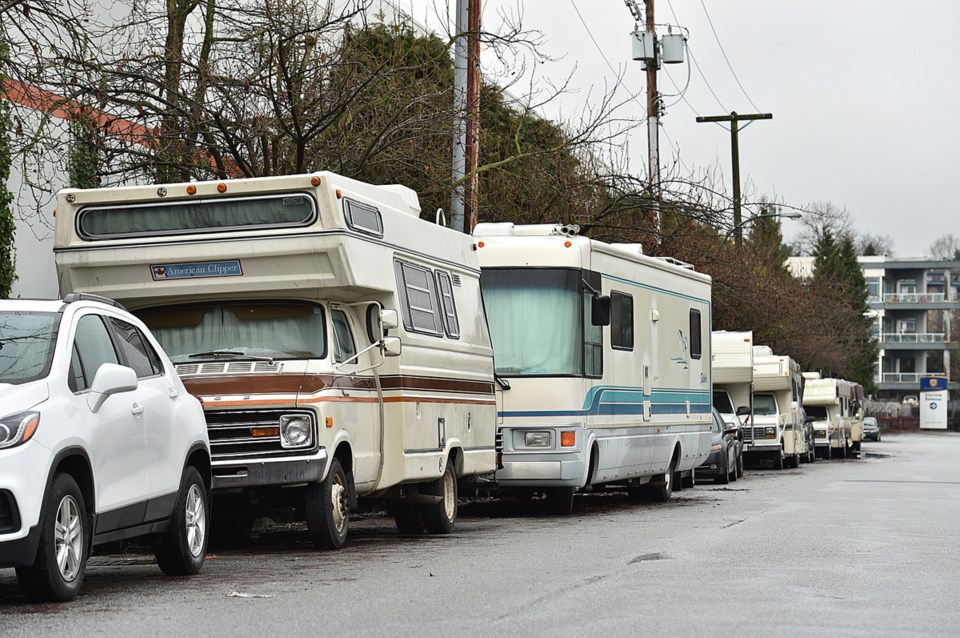
Modular housing
The frustration of Vancouverites who continue to witness the detrimental effect of an unaffordable city is also a frustration of Whitty's and Vision Vancouver Coun. Kerry Jang, who got amped up quickly and used some colourful language when told about concerns of staff and customers along the Evans Avenue-Glen Drive strip.
"Shoving them out of the way doesn't work," he said by telephone. "What do they want me to do? Push them out? Put them in another f***ing parking lot somewhere? No, I'm not going to do that. We can't do that. As soon as you treat them as pariahs, you're inviting trouble."
Jang and Whitty are clear that setting up a tent-city type zone for vehicle dwellers is not going to happen, with Whitty saying "it's not the direction the city wants to go in."
"The city wants to go in the direction of housing and keep focused on that," she said. "If the crisis deepens, then maybe we'll have to look at other options. But at this point, we're trying to deal with people on a one-to-one basis."
Their solution is getting 600 units of temporary modular housing built this year for homeless people and those at risk of becoming homeless. The city will open its first building in Marpole this month. Ten to 12 buildings, with $66 million in funding from the provincial government, are expected to be built across the city.
"We don't want to create RV parks," Jang said. "The whole point is getting people out of these things and into homes. That's my solution, so you won't need to live in an RV, or have RV parks. That's why we're building modular housing."
'Fighting an illness'
Meanwhile, Hocking is staying put for now.
He believes he's on B.C. Housing's waiting list for a home. He's worried, though, that he might lose the motorhome before he finds a new place.
"If we get kicked out of here, I don't know what we're going to do," he said of life in the motorhome with Geraldine and his roommate. "She's crippled, plus we have a cat that's like a child to us. We've had him since he was a baby. It's just a cat. We don't have kids, but he's really important to us."
Hocking's story of how he ended up in this state isn't clear, although he said he left Rossland when he was 19 to come to Vancouver to find work as a carpenter. Then, at 34, he got sick.
"I had a good life when I grew up. My mother looked after me. I had no father. I skied all my life," he said. "Now I'm fighting an illness and trying to survive it."
He has experienced first-hand what so many only observe and offer opinion.
Well, here's what Hocking thinks.
"I see that there's a problem with rent in this city. People are buying places and they're not renting them out. They're leaving them empty. They should just rent them out. It's just a ridiculous amount of people that I've seen who are homeless now. I never heard of that until the last four or five years. Now it's worse than ever. Really bad. It's crazy."
mhowell@vancourier.com
